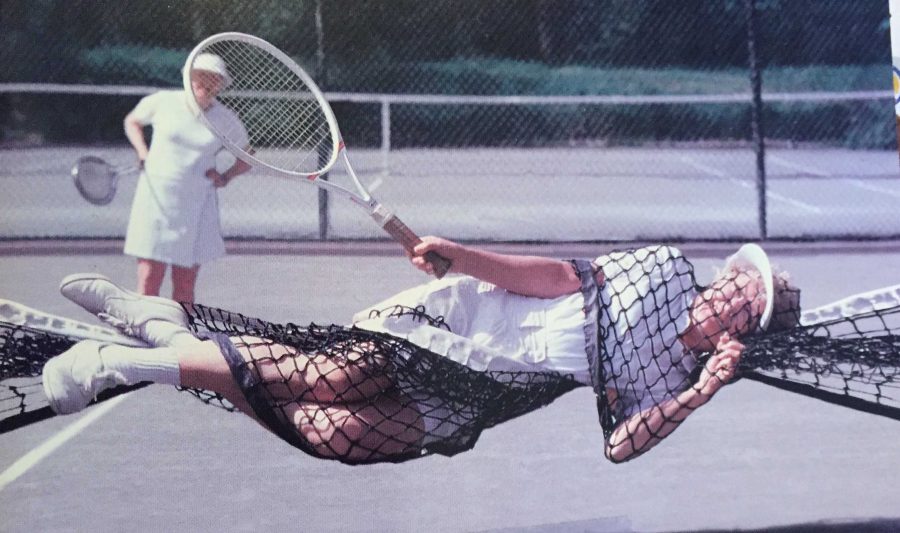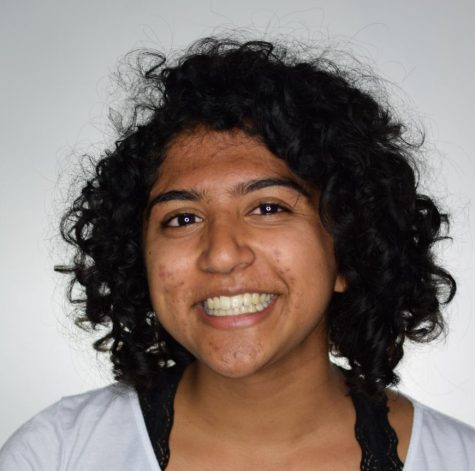n her native Sherman Oaks, Calif., then-9-year-old Kay Wells was swimming at a local pool while the city’s youth competitive team practiced in the lanes beside her. It was an all-boys team, as girls playing sports was uncommon when Wells was growing up in the 50’s and 60’s. Despite this, she got out of the pool and walked over to the team’s coach and told him that she could beat any of the boys on his team. The coach laughed. Undeterred, the young Wells struck a deal with him: if she won, she could join the team.
“He thinks there’s no chance in the world, so he says sure,” Wells said.
She defeated her competition, the fastest on the team, by a whole body length. The coach hesitantly allowed Wells to become the most dominant swimmer on the team.
“I wanted to prove something to the coach and myself,” Wells said. “And since then, I’ve been obnoxiously competitive.”
After moving to the Bay Area, Wells went on to play multiple sports in high school and now teaches sports ranging from tennis to archery at local clinics. She continues to play tennis competitively three times a week. Wells’ age doesn’t stop her from playing sports and staying active, just as being a girl didn’t stop her in her youth. Though she is now over 65 years old, Wells doesn’t believe that getting older will stop her from doing what she loves.
“I know 80 and 90-year-old men and women still playing tennis … and they’re running out there,” Wells said. “That’s because they’ve stayed in the sport. Age has nothing to do with it.”
Fifty-seven-year-old Glenn Kubacki, a longtime friend of Wells, agrees. Kubacki is an avid biker and swam and played water polo in high school. In college, Kubacki got into biking in order to stay fit. He didn’t consider himself to be very good, but unlike Wells, Kubacki’s reason for biking wasn’t competition; it was to have fun.
For him, sports were an opportunity to gain new experiences and build character, and this mindset didn’t change as he got older. Kubacki bikes because he still enjoys it as much as he did when he was younger. His performance may have deteriorated, but the amount of effort he puts in hasn’t changed.
“Your body breaks down but you still keep trying,” Kubacki said. “I may not go as fast, I may not be able to go as far, but I’m not going to try any less, and that’s always been the case.”

Wells echoes these sentiments, adding that getting older never has or will stop her from participating in sports, despite it making her slower. But Wells rarely mentions this slowness, because her focus is not on the negative aspects of her age, but only on getting better in her sport. She believes that the only way to get better is to keep playing and to practice.
Practice is something Thomas Orsua, MVHS’ 67-year-old assistant track coach and custodian, hopes will allow him to regain the athleticism of his youth. A cross country and track star in high school, Orsua had trouble reconnecting with sports after quitting in college, and later attempts to get back into shape were generally sporadic and unsuccessful. Orsua found his increasing age preventing him from exercising.
After becoming assistant track coach, Orsua tried both running and biking again so he could be alongside his racers during practice. However, he found them difficult and decided to coach through offering his knowledge of track.
Orsua strives to change that this year. Hoping to get into good enough shape to ride with his runners, Orsua set his bicycle up in his house so he can start working out inside. He can currently stay on for a maximum of five minutes, but stays optimistic.
“If I could do five minutes and then get up to 10 minutes, [I can] eventually get to the point where I can go outside and start riding again,” Orsua said. “I’m trying to work out, but I’m not pushing myself.”
When he does get good enough, Orsua hopes to race bicycles like Kubacki and get fit enough to run a mile. Eventually, if he can maintain his fitness, Orsua hopes to be able to run a marathon like he did in the past. However, his only goal is to finish.
“To me it’s like I don’t have the desire to break the tape,” Orsua said. “I don’t want to be number one, because to do that I would have to really dedicate myself to running constantly, and I just don’t find that I have that time anymore, especially with work.”
Orsua’s laid-back attitude towards fitness stands in stark contrast with Wells’ competitive mindset, which drives her to shape her life around sports. Orsua on the other hand finds that his physical fitness comes in second after his career and relationships. Wells knows how difficult it can be to stay in shape, but advocates an active lifestyle for everybody.
“You gotta be motivated to stay healthy,” Wells said. “And exercise will keep you very healthy … I don’t care what age you are.”
To Wells, fitness is unrelated to age. According to her, despite negative effects aging can have on the body, staying fit is both possible and necessary for everyone. She and Kubacki prove this through their own involvement in sports. Kubacki continues to bike 100 mile races, and although he can’t go as fast as he used to, he can still make it through. Wells continues to play tennis and still has game; when Kubacki met up with Wells for a friendly tennis match, he was unable to keep up with her.
“My body doesn’t quite hold up to running around on a tennis court,” Kubacki said. “Not the way she plays. She’s very, very good.”
Wells knows how she beat him, and it doesn’t have to do with either age or fitness. Her secret lies in having a positive attitude, and in her words, “practice, practice, practice.”
“All you have to do is have a mindset that … [you] can do it,” Wells said. “If you stay with [a sport], you can play it forever.”
To Wells and Kubacki, continuing to play their sports is all about their passion for them. Their age doesn’t change their desire to maintain their athletic lifestyle or their willingness to play sports. Just as Wells beat the previously held assumption that girls couldn’t play sports when she was younger, she, Kubacki, and older athletes are now destroying the stereotype that they can’t be athletic. At the same time, older athletes like Orsua prove that it is never too late to try.
“The bottom line is, it’s not about age,” Wells said. “It’s about always staying in the game … and not being afraid to try.”







